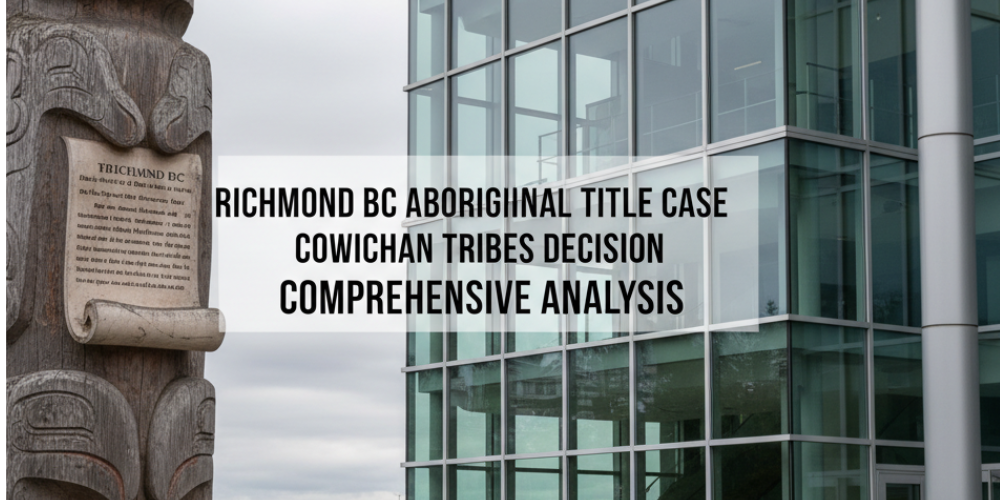Richmond BC Aboriginal Title Case: The Cowichan Tribes Decision and the Future of Private Property in Canada 🏛️

Overview
On August 7, 2025, the British Columbia Supreme Court issued a landmark ruling in Cowichan Tribes v. Canada (Attorney General), 2025 BCSC 1490, marking one of the most consequential Aboriginal title cases in Canadian history. Following 513 days of hearings over 11 years, Justice Barbara Young ruled that the Quw’utsun Nation—including the Cowichan Tribes, Stz’uminus First Nation, Penelakut Tribe, Halalt First Nation, and Lyackson First Nation—holds Aboriginal title to approximately 750–800 acres of land in southeast Richmond, British Columbia.
This decision is unprecedented because it’s the first time in Canadian history that a court recognized Aboriginal title over land including private properties in an urban area.
The Claim Area and Parties Involved
The disputed territory, located on Lulu Island, covers about 1,846 acres and includes:
- Federal Crown lands
- City of Richmond municipal lands
- Vancouver Fraser Port Authority lands
- Private fee simple properties (homes, farms, golf courses, and commercial areas)
- Submerged lands along the Fraser River
The Cowichan Nations brought the case against multiple defendants, including the federal and provincial governments, the City of Richmond, and the Vancouver Fraser Port Authority, along with Musqueam and Tsawwassen First Nations, who opposed the claim on territorial grounds.
Court’s Key Findings
1. Aboriginal Title Recognized
The court ruled that the Cowichan Nations satisfied the legal test for Aboriginal title by proving:
- Sufficient occupation of the land before European sovereignty,
- Continuity of occupation, and
- Exclusive historical control.
2. Title and Fee Simple Can Coexist
In a groundbreaking finding, Justice Young ruled that Aboriginal title and private ownership can coexist, challenging long-held assumptions that they are legally incompatible.
3. Aboriginal Title Is “Prior and Senior”
The decision emphasized that Aboriginal title is a constitutionally protected right under Section 35(1) of the Constitution Act, 1982, and takes precedence over fee simple ownership granted by the Crown.
4. Public Land Titles Invalidated
The court declared that Crown grants of public lands in the claim area were invalid because they infringed on Aboriginal title.
5. Private Landowners Not Targeted
Private property owners were not targeted or stripped of their titles. The Cowichan Nations did not seek to invalidate private ownership.
6. 18-Month Transition Period
Justice Young suspended implementation for 18 months to allow negotiations among the Cowichan Nation, Canada, and Richmond.
Impact on Property Owners and Landlords
The ruling triggered major uncertainty for about 150 property owners in the affected area:
- Title Uncertainty: Richmond’s mayor warned owners that their property titles “may be compromised.”
- Mortgage and Financing Issues: Banks have pulled mortgages, and real estate sales have stalled due to uncertainty over ownership.
- Development Freeze: Property owners have paused development projects and business investments.
- Property Values: Listings in the area have dropped significantly.
- Taxes and Insurance: Owners question why they must continue paying property taxes amid title confusion, and insurance implications remain unclear.
For landlords, these issues translate into potential problems with leasing, financing, and resale, as well as questions about future regulatory control if Aboriginal title holders gain jurisdictional authority.
Broader Legal and Economic Implications
The Cowichan decision may reshape how Aboriginal title interacts with property law nationwide.
- In BC: The province, where about 95% of land is unceded, could see ripple effects across the housing and investment markets.
- Across Canada: The same constitutional principles could apply to Quebec, Ontario, and Atlantic provinces, particularly where land is unceded.
- In Treaty Provinces: Prairie provinces (Alberta, Saskatchewan, Manitoba) face less exposure since historical treaties largely extinguished Aboriginal title.
Experts warn that uncertainty could impact mortgage lending, property insurance, and real estate development if lenders and investors lose confidence in land title stability.
Appeals and Political Reactions
All major parties, including the Province of BC, Canada, the City of Richmond, and several First Nations, have filed appeals. The Cowichan Nation itself is also appealing to seek recognition of the full claim area.
Premier David Eby announced that the government will request a stay of implementation, seeking stability while appeals proceed. The case is widely expected to reach the Supreme Court of Canada due to its national significance.
Politically, the case has become highly charged, with opposition leaders demanding urgent federal review and homeowners expressing frustration over the lack of early notice.
Outlook
The Cowichan Tribes decision represents a turning point in Canadian property and constitutional law, redefining how Aboriginal title and private ownership coexist.
In the near term, uncertainty will likely persist while courts and governments determine:
- Whether fee simple ownership can remain intact under recognized Aboriginal title;
- How to balance reconciliation with economic stability; and
- What compensation or co-management frameworks might emerge.
Until appeals are resolved—likely taking several years—property owners and investors in the Richmond area and beyond face a challenging landscape shaped by a fundamental question:
Who truly owns the land beneath Canada’s cities and towns?
⚠️ Disclaimer
This article is for informational purposes only. The content below is compiled from publicly available online sources and may not be entirely accurate or up to date. Readers are strongly encouraged to conduct their own research and consult professional legal experts or government sources for official and verified information.
📚 References & Sources
MLT Aikins LLP – B.C. Supreme Court Recognizes Cowichan Aboriginal Title in Landmark Ruling
MLT Aikins LLP – What Is the Cowichan Decision and Why Is Everyone So Worked Up?
JFK Law – Landmark Decision in Cowichan Tribes Case
OKT Law – The Historic Cowichan Decision: Aboriginal Title Declared to Fee-Simple Land
Global News – Canada’s Longest Trial Ends in Precedent-Setting B.C. Land Claim
Cassels Brock LLP – Landmark Ruling in Cowichan Tribes v. Canada (Attorney General)
BD&P Law – B.C. Supreme Court’s Recent Cowichan Decision
Mandell Pinder LLP – Cowichan Tribes v. Canada (Attorney General), 2025 BCSC 1490 – Case Summary

